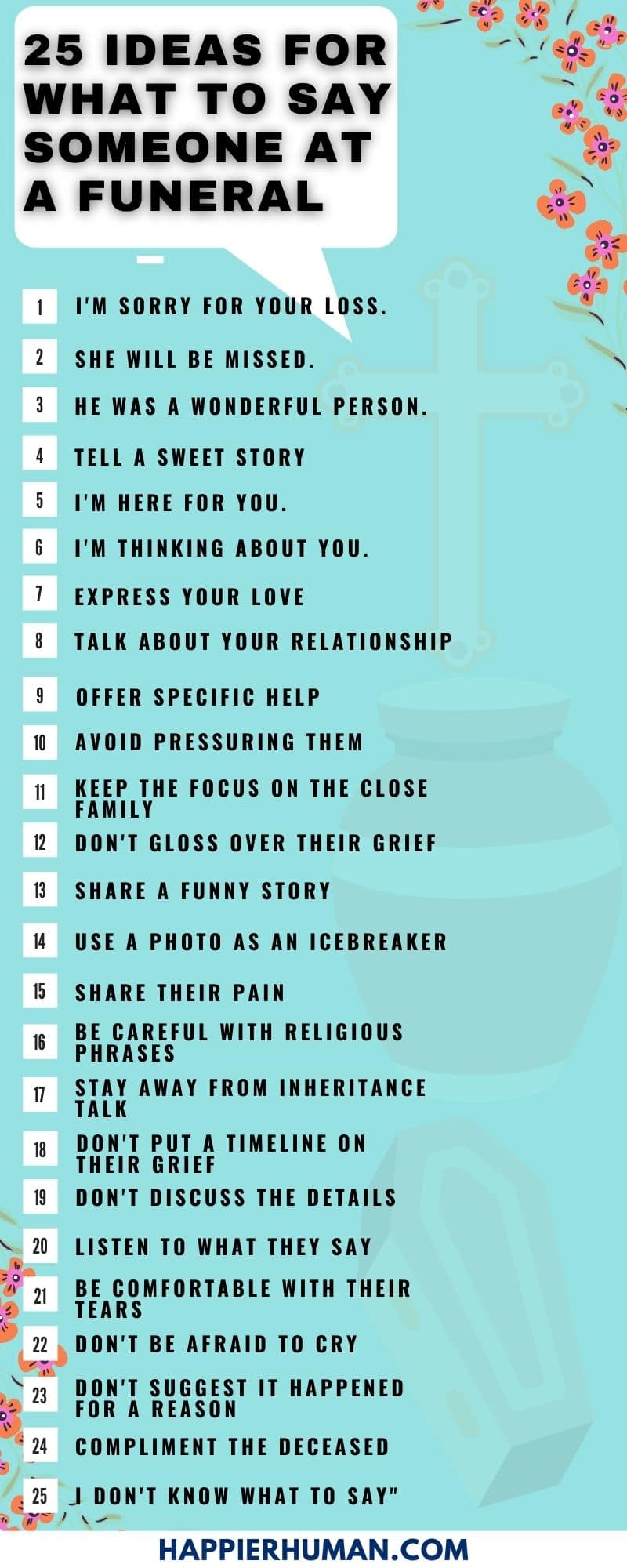Funerals are an important social event, but they can be difficult for people to navigate.
Since most of us fortunately don't get much practice attending them, it leaves many people feeling anxious and struggling to think of things to talk about.
Striking the balance between providing emotional support for other mourners without being overbearing or accidentally thoughtless is a fine line to walk sometimes, but there are some tried-and-true strategies you can use to avoid committing any major faux pas.
While it's important to assess the social situation and consider your relationship with the other attendees, many condolences are fairly universal.
If you find yourself wondering what to say at a funeral, here are 25 words of comfort you can use.
1. I'm Sorry for Your Loss.
This is one of the simplest things to say, which makes it perfect for almost any situation. It expresses your condolences in a graceful, understated way, and it is equally appropriate regardless of your relationship to the deceased and their family.
2. She Will Be Missed.
This is another classic sentiment, but it works well because it reminds the grieving family that others cared about the deceased. It helps them feel less alone and reminds them that other people loved the person they lost.
3. He Was a Wonderful Person.
Although this is somewht generic, it is still a lovely thing to say to grieving people. You can also customize it with specific details about the deceased person to create more of an impact, such as mentioning a time when their good character really stood out.
4. Tell a Sweet Story
If you had a personal connection with the deceased, it can be helpful to share a small anecdote about a time they made a positive contribution to your life. It can be a time they helped you personally or a good deed they did for others. Keep it short and sweet, as many other people will be sharing their own stories and remembrances.
5. I'm Here for You.
When a loved one passes away, close family members often feel alone and unsupported. Make sure they know you're there for them by explicitly telling them so.
6. I'm Thinking About You.
If you can't offer help, simply letting them know that you're thinking about them can help people feel less alone. You can also let them know that they're in your prayers, but this one can be a little trickier. Some people who aren't religious may not appreciate that sentiment as much, so know your audience.
7. Express Your Love
If you had a close relationship with the deceased, it's okay to say that you love them. Something like, “I loved Aunt Susan, I'm going to miss her,” generally will go over well with other family members.
8. Talk About Your Relationship
It can be hard to know how to talk about your relationship with friends or coworkers, especially if you never got to know their family in person. In those situations, it can be okay to talk about your relationship with the deceased. Phrases like, “He was like a brother to me,” can express how close you were to a good friend. Don't exaggerate, though. If the truth is simply, “I enjoyed working with her; she was a positive force in the office,” then that's fine to say.
9. Offer Specific Help
“If you need anything, let me know,” is a common thing people say, but experts recommend offering more specific help. People who have just lost a loved one are often overwhelmed and can't think of anything or don't want to impose. Instead, give them ideas of things you can help with, such as babysitting their children or picking up groceries.
10. Avoid Pressuring Them
Offering help can be a bit of a fine line, though, as you don't want to make them feel obligated to socialize if they're not ready. A good way to offer emotional support is to say, “If you ever need to talk, please don't hesitate to call me.”

11. Keep the Focus on the Close Family
When you're speaking to a grieving person, try to avoid centering the conversation on yourself or your experiences. It may feel supportive to say, “I know how you're feeling,” and share a story of a person you've lost, but that often makes people feel ignored. Instead, stick to statements focused on them and their loss.
12. Don't Gloss Over Their Grief
Sometimes well-meaning people use phrases such as, “She's in a better place,” or “At least he isn't in pain anymore,” in an effort to make the family feel better. However, that often backfires by making them feel like their grief isn't being acknowledged. Stick to statements acknowledging the loss. Any positive comments should be about the person's life, not their death.
13. Share a Funny Story
This one takes a little more social skill and should be avoided if you aren't completely certain that it will go over well. However, in certain situations, a funny anecdote can help people feel better. Keep it family-friendly and don't use it as a chance to test out your comedy skills.
14. Use a Photo as an Icebreaker
If you're going to a funeral where you don't know many people, you may want to bring along a few copies of photos you have of the deceased. Show them to the family and other friends of the deceased, and tell the story behind when it was taken.
15. Share Their Pain
When supporting a close friend through grief, it can be okay to offer a little more direct empathy. “Even though I wasn't as close to him as you are, when you're in pain, I feel pain too. I'm here for you,” can help them feel supported and validated.
16. Be Careful with Religious Phrases
Know your audience before talking about religion or prayer, as some people may find these at best meaningless and at worst offensive. It's better to stick to more generic phrases with people whose religious affiliation you don't know.
17. Stay Away from Inheritance Talk
Never bring up any sort of conversations about inheritance at a funeral. At best it's tacky, and at worst it can bring up contentious issues that can lead to fights. It's best to generally stay away from practical matters entirely. The funeral should be a celebration of the person's life, not a time to sort out their estate.
18. Don't Put a Timeline on Their Grief
Another common faux pas at funerals is to talk about a timeline for grieving, such as suggesting they'll feel better soon or that the funeral is offering them some sort of closure. Everyone grieves and recovers on a different timeline, and it's important to respect that.
19. Don't Discuss the Details
Similarly, avoid talking about how the person died while at the funeral. Even if you're comfortable discussing it, some people who overhear you may not be.
20. Listen To What They Say
If you start sharing a story or offering help and the grieving family member dismisses you, don't force the issue. Sometimes even simple or innocuous comments will be too much for someone deep in grief, so if that happens, simply listen to them, apologize, and move on.
21. Be Comfortable with Their Tears
Many people are uncomfortable with displays of emotion, especially crying. However, it's important to put your discomfort with that aside at a funeral. If someone starts crying around you, tell them it's okay. Avoid saying, “Don't cry,” or anything like that.
22. Don't Be Afraid to Cry
Similarly, if you start feeling the need to cry, don't feel like you have to fight it off. Sometimes people fall into the trap of thinking that offering support requires them to be stoic, but grieving family members often are touched and feel supported by seeing other people cry over their loved one.
23. Don't Suggest It Happened for a Reason
“Everything happens for a reason,” is a common phrase, but never say it at a funeral. Instead, stick to phrases that acknowledge the pain they're in and the loss they feel.
24. Compliment the Deceased
Complimenting a specific quality the person had can be a good way to reminisce about them, particularly if they were passionate about that hobby. “I loved hearing her play the guitar,” or “He was such a talented woodworker,” help reassure grieving family members that their loved ones will be remembered.
25. “I Don't Know What to Say”
If you find yourself talking to a grieving person and your mind goes blank, it's okay to simply tell them that you're at a loss for words. “I don't know what to say, but I'm sorry,” is completely acceptable.
Final Thoughts on What to Say at a Funeral
Whether you're mourning a close friend or a distant relative, the most important thing to remember when deciding what to say at a funeral is simply to always be compassionate and kind.
Everyone's experience with grief is slightly different, so be prepared to tailor your approach if necessary so you can provide the best support possible to those around you.
For more inspiration about what to say at a funeral or during a eulogy, consider reading through a list of insightful quotes about grief from some of the most brilliant minds in history.


